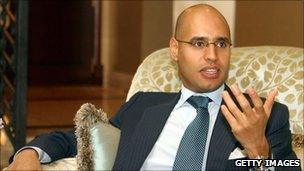UK university reviews funding from Libya
- Published

Saif al-Islam Gaddafi, a son of the Libyan leader, is an LSE graduate
The London School of Economics has said it is reconsidering its links with Libya "as a matter of urgency".
The LSE has run courses for Libyan officials and has received a £1.5m donation from the Gaddafi International Charity and Development Foundation.
Colonel Gaddafi's second son, Saif al-Islam, studied at the LSE, gaining both a Master of Science and a doctorate.
The LSE statement follows a speech made by Saif on Sunday, in which he said the regime in Libya would stand firm.
He warned of civil war and rejected foreign intervention.
Saif al-Islam Gaddafi wrote his doctoral dissertation on the role of civil society in the democratisation of global governance institutions.
Courses
The LSE has offered executive education programmes to Libyan officials. "No further courses are in preparation," the university's statement said, external.
"We have also received scholarship funding in respect of advice given to the Libyan Investment Authority in London," it continued.
"No further receipts are anticipated."
In 2009, the university was pledged £1.5m from the Gaddafi International Charity and Development Foundation for its North Africa Programme.
The university said it has accepted £300,000 of that grant and the funds so far had been used to develop a research programme on North Africa, focused on politics, economics and society.
"In current difficult circumstances across the region, the School has decided to stop new activities under that programme.
"The Council of the School will keep the position under review.
"The School intends to continue its work on democratisation in North Africa funded from other sources unrelated to the Libyan authorities."
'Opportunity for reform'
Saif al-Islam Gaddafi, 38, enrolled at the LSE in 2003 for an MSc which he completed. He continued his studies there, and was awarded a PhD in 2008.
Professor David Held, who supervised his PhD studies, said he watched his former student's speech and was "deeply disturbed by its failure to grasp the changing circumstances of the Middle East in general, and of Libya in particular".
"Rather than seeing the opportunity for reform based on liberal democratic values and human rights, Saif al-Islam Gaddafi stressed the threat of civil war and foreign intervention.
"I have known Saif al-Islam Gaddafi for several years since he did a PhD at the LSE. During this time I came to know a young man who was caught between loyalties to his family and a desire to reform his country.
"My support for Saif al-Islam Gaddafi was always conditional on him resolving the dilemma that he faced in a progressive and democratic direction.
"The speech last night makes it abundantly clear that his commitment to transforming his country has been overwhelmed by the crisis he finds himself in. He tragically, but fatefully, made the wrong judgement."
The LSE Students' Union said it was "totally unjustifiable and contradictory of LSE to operate on funds which contravene its guiding principles".
"We welcome the School's decision to take no further funding from the Gaddafi International Charity and Development Foundation; however, we believe that this does not go far enough.
"The school should take action to ensure that the money that was stolen from the Libyan people for our benefit, is now used for the benefit of Libyan people."
- Published21 February 2011
- Published22 February 2011